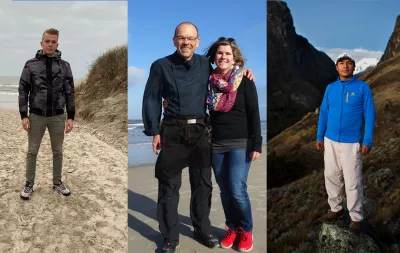The Right to a Future – Demanding Climate Justice in Court

Anyone who violates another person’s fundamental rights by emitting greenhouse gases bears a double legal duty: First, to put a stop to this harm so that the (fundamental) rights of others are not undermined. Second, polluters have to account for the protection of those at risk as well as the damages that still occur. In order to enforce these legal obligations in Germany and internationally, Germanwatch supports three climate lawsuits.
Lüke Recktenwald from Langeoog already observes the effects of climate change on the East Frisian Island: increasing storm surges, enhanced dune erosion and saltwater intrusion into the island’s only freshwater lens. Whether Lüke will be able to live and work here in the future is uncertain. More and more young people share this experience. They will live through the effects of global warming in the second half of the 21st century, when they will be of much greater intensity compared to what we are already experiencing today. Current inadequate political action severely threatens their fundamental rights to a dignified future, physical integrity, health, property and free choice of profession. This is why Lüke and his family decided to turn to the courts.
Using the law to demand more ambitious climate policies for Germany and Europe
Together with seven children and young adults, including Luisa Neubauer of Fridays for Future, Lüke filed a constitutional complaint with the Federal Constitutional Court in February 2020. Therein, the young plaintiffs argue that, due to weak emission reduction targets, the Federal Climate Law passed in November 2019 is not sufficient to contain the climate crisis nor to fulfil Germany’s obligations under the Paris Agreement. They also state that the law represents nothing more than a national implementation of an inadequate European climate target for 2030. Together with Greenpeace and Protect the Planet, Germanwatch supports this lawsuit.
Since 2018, Lüke's family has been demanding protection of their fundamental rights through a more ambitious climate policy at the European level. Jointly with other affected families from the EU, Kenya and Fiji, the Recktenwalds filed a lawsuit at the European Court. As farmers and foresters, hotel owners and reindeer herders, they are all already suffering from the consequences of the climate crisis. Through the People's Climate Case, they call on the EU to set ambitious climate targets and protect their fundamental rights. The first instance court dismissed the lawsuit as inadmissible in May 2019. Its reasoning was paradoxical: Since climate change affects everyone, the plaintiffs are not individually (meaning solely and exclusively) affected by climate change and therefore have no right to sue. This means that the more people’s fundamental rights are violated due to weak climate policy, the less they can enforce these rights in front of EU-courts. The plaintiffs filed an appeal against this ruling in July 2019. Germanwatch supports this lawsuit together with CAN-Europe and Protect the Planet. A decision by the second instance court is expected within the next months.
Holding polluters accountable
The third climate lawsuit does not hold governments accountable, but RWE as Europe's largest single emitter of CO₂: Peruvian small-scale farmer and mountain guide Saúl Luciano Lliuya wants the energy company to assume its share of responsibility for the climate damage that it has partially caused. Due to climate change induced glacial retreat, a glacial lake above the Andean city of Huaraz has grown in size and threatens to overflow or even break its dam. The plaintiff's property along with large parts of the city are at risk of a devastating flood that would affect up to 50,000 people. The RWE Group is responsible for around half a percent of all industrial greenhouse gas emissions since the beginning of industrialisation. Saúl Luciano Lliuya therefore demands that the company cover around 0.5% of the costs for safety measures at the lake. In a historic breakthrough, the court of second instance in Hamm gave a clear statement that large emitters like RWE are liable for supporting people affected by climate damages. The proceedings are now entering a decisive fifth year: the court accepted the legal argument, now the scientific argument is being examined in the evidentiary stage of this case. As part of this, a court-appointed on-site visit to Huaraz will take place soon.
The People's Climate Case and the constitutional complaint are test cases that aim to protect the fundamental rights of an increasing number of people affected by climate change through adequate climate protection. The Huaraz Case aims at the concrete protection of one individual. All three cases share the objective of building legal and political pressure and bringing about the necessary international political solutions. In view of the climate crisis, the protection of fundamental rights - on which our democracy is based - also requires the development of new legal mechanisms.
You want to support the climate suits?
- Show solidarity with the EU-plaintiffs by signing this petition:
https://act.wemove.eu/campaigns/the-people-vs-eu-climate - Support the People’s Climate and Huaraz Cases with a donation to Germanwatch:
www.germanwatch.org/en/donate
IBAN: DE95 3702 0500 0003 2123 23
Germanwatch supports the Recktenwald Family, Saúl Luciano Lliuya and the international network of plaintiffs through ideational guidance, concrete advice, networking and public relations work.

